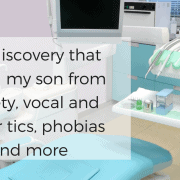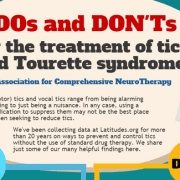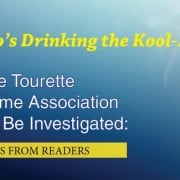Can the Answer We Found for our Son’s Tics Help You?
SHARED BY CAMERON’S MOTHER
We live in Australia where I’m a stay at home mum (with a postgraduate degree in psychology and a background in social service work). Our son, Cameron, was seven when he developed tics. They included head jerks, eye blinks, and jaw circles, among others. The tics were rapidly increasing in frequency and intensity. I found your ACN Latitudes site and was interested to see a common thread running through many parent comments. Many had observed that reducing their child’s exposure to allergens resulted in a reduction in tics.
I took our son to a general practitioner and asked for an allergy test. It came back with very high allergy levels, and we were referred to a paediatric allergist, who diagnosed dermographism (this condition includes high amounts of histamine being released from mast cells). The allergist put him on an adult dose of Telfast daily, 180 mg divided into a half tablet morning and half in evening. [Editor: The main active ingredient in Telfast is fexofenadine. Antihistamine products with fexofenadine are sold under a number of brand names, including Allegra. See here.]
The doctor said it needed to be this high because his histamine levels are so high. It would cost a lot more to use a children’s antihistamine and achieve the same dosage. He assured us it is a safe treatment and can be used long-term. He told us it is designed to be non-drowsy and even pilots are allowed to fly when taking it.
We were instructed to give Cameron a break from the Telfast for two days at the end of each month. When we first started giving it to him, the tics appeared to increase with the Telfast, but within a week and a half the tics had completely stopped. During the break from the Telfast at the end of each month, the tics would return. Once back on the Telfast, they would disappear again within a couple of days.
After five months of this pattern of the tics returning every time he was off the Telfast, and disappearing when he was back on it, we contacted the allergist who said it was fine not to take the two- day break.
We attended a previously planned appointment with a neurologist about six months into using the Telfast. He said he didn’t understand exactly why it was working, but since it was, we should keep him on it. He said Telfast is not supposed to cross the blood-brain barrier, the membrane of the brain, but that some of it obviously was crossing to have this effect on the tics.
Cameron has been a generally healthy child. He had mild asthma when young, but no puffers (inhalers). He has small calcified gallstones that were found on an ultrasound and x-ray at five years, and had a lot of tummy pains when younger. Lactose-free milk and limiting fatty foods reduced tummy pains to almost non-existent.
It has now been more than two years with no tics, unless Telfast is missed. The only time we have seen any tics whilst on Telfast was at his first public choir performance where he was extremely nervous to be singing publicly. Perhaps this is not surprising, as stress can increase histamine levels.
Also of interest is that our son knows the Telfast is for his dermographism, but we haven’t mentioned to him the correlation with tics/no tics, so there is no possible placebo effect either. He has also slept a lot better at night since being on Telfast.
I wanted to share this as a possible area for research, as it would be great if an anti-histamines (and/or low-histamine foods) were able to help some other children. This would surely be preferable to the strong drugs sometimes used to treat tics and Tourettes.
It seems from the online reading I did at the time that high histamine is also commonly found in people with autism and some mental health disorders, so the implications could potentially be further reaching. Perhaps there’s something simple like high histamine levels making the membrane of the brain more permeable, so yeasts and other things that shouldn’t cross over into the brain are doing so in these individuals? This is way out of my depth of knowledge, but I figured you may know people who can potentially research it and hopefully help others.
The only other thing we do is limit the amount of processed meats our son eats, and we have cut out canned tuna, smoked salmon, and leftovers altogether, as they can be very high in histamine.* Cameron does eat other high-histamine foods and some packaged foods (e.g. pastas, taco shells). He has always eaten a lot of meat, fruit, and vegetables and has regular treats, although we generally avoid Twisties, cheeses, Burger Rings, etc. He’s never been allowed Coke and rarely has soft drinks. While his diet is generally nutritious, it is by no means strict. I’m keen to move the whole family to more natural foods, but am not there yet.
I also want to say a huge “thank you”’ for such a brilliant site, with special gratitude to all the parents who have shared their experiences. This site had the most useful information I found when searching!
*For more information on histamine and foods see this article, from Foods Matter.










Which types of tests test histamines and salycilates?
Hi there,
We are in a very similar situation currently, where higher doses of telfast seem to manage my son’s tics – I was wondering how your son is doing these days and if you still require telfast.
Thanks for your article – it has been so helpful for our family!